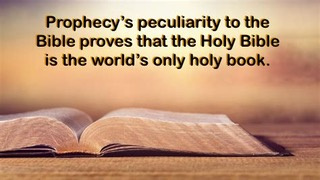 Prophecy is history prewritten. It is the heralding of what will happen before it happens. The biblical prophets were both forth-tellers and foretellers. First, they were forth-tellers. They spoke forth or preached God’s Word or message to the people of their own day and time. Second, they were foretellers. They foretold or predicted the future for those who would live in subsequent days and times. It is safe to say, therefore, that the biblical prophet possessed both insight and foresight.
Prophecy is history prewritten. It is the heralding of what will happen before it happens. The biblical prophets were both forth-tellers and foretellers. First, they were forth-tellers. They spoke forth or preached God’s Word or message to the people of their own day and time. Second, they were foretellers. They foretold or predicted the future for those who would live in subsequent days and times. It is safe to say, therefore, that the biblical prophet possessed both insight and foresight.
According to Deuteronomy 18:19-22, the true test of a prophet was whether or not his predictions came true. If they did, he was a true prophet of God. He served as God’s mouthpiece, a spokesman for God whose mouth had been filled by the Spirit with the very words of God. If his predictions did not come true, however, he was a false prophet, a charlatan who was to be put to death by the people of God for presuming to put words into the mouth of God.
The Apostle Peter explained how the prophets of old spoke only those words that the Holy Spirit breathed into them (2 Peter 1:21). It wasn’t their opinions that they preached, but the oracles of God (1 Peter 4:11). Consequently, they were required, under penalty of death, to be 100 percent accurate in all of their prophesying.
Neither Nostradamus—whose vague and pliable prognostications lend themselves to multiple interpretations—nor modern-day prognosticators—who are often wrong, but never in doubt—would have fared well or lasted long in ancient Israel. It is doubtful that the likes of Jean Dixon or Edgar Cayce—whose prolific predictions proved on the whole to be about as precise as a dart-throwing monkey’s—would have survived a single day without being stoned to death in biblical times.
In biblical times, unlike today, it was a serious thing to profess to be a prophet of God. Making such a claim meant imperiling your life every time you uttered a prophetic word. There was no margin for error. One mistake and your prophetic career came to an abrupt end.
It has been estimated that two-thirds of the Bible is prophetic either in type, symbol or direct statement. Interestingly, none of the so-called holy books and sacred writings of the world’s other religions contain a single line of prophecy. How do we explain this abundance of prophecy in the Holy Bible and absence of it in all other “holy books”?
I believe the answer to the above question is obvious. If the uninspired (at least divinely uninspired) authors of the world’s other “holy books” had attempted to predict the future their predictions would have proven untrue. As a result, they would have been exposed as frauds, their writings as fictitious, and their teachings as false. To have any hope of perpetrating their religious ruse upon the masses these false prophets had to steer clear of prophecy, abdicating its lofty sphere to God’s true seers.
The Bible teaches that only God can predict the future. In Isaiah 46:8-10, the Lord declares, “Remember this…I am God, and there is no other, I am God, and there is none like me. Declaring the end from the beginning, and from ancient times the things that are not yet done.” Since it is by His divine providence that the future unfolds, it is God alone who can foretell the future (Isaiah 44:6-7).
How about the gods of the world’s other religions? According to the Bible, they are all proven false by their powerlessness to predetermine and their inability to predict future events (Isaiah 41:21-23; 45:20-22). To worship them, nonexistent entities invented in the imaginative minds of men, rather than the one and only true God, who alone determines and declares what the future holds, is the height of folly.
Not only is the God of the Bible proven to be the one and only true God by the fact that He alone predicts the future, but the Bible is proven to be the Word of God by the fact that it alone contains prophecy. Prophecy’s peculiarity to the Bible proves that the Holy Bible is the world’s only holy book. All other “holy books” are exposed as unholy frauds by the absence of prophecy from their pages.

